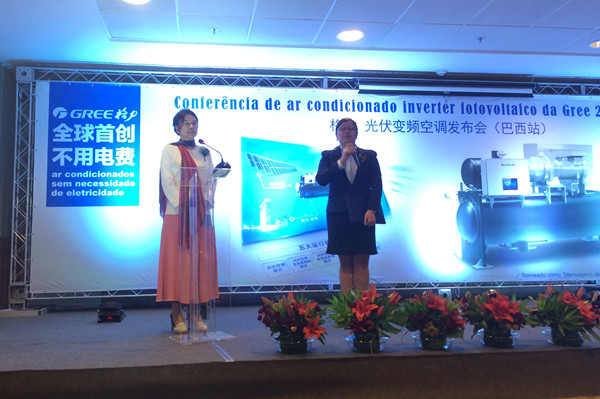Chinese company unveils new air conditioner in Brazil
By BRUNA GAMA and JI YE in Rio de Janeiro For China Daily (China Daily Latin America) Updated: 2015-05-26 07:01
 |
|
Gree President Dong Mingzhu (left) speaks to a journalist during new-product launching ceremony on May 22 in Rio de Janeiro. PROVIDED TO CHINA DAILY |
Gree, an air-conditioner manufacturer from China, unveiled its latest zero-energy consumption unit in Rio de Janeiro.
The launch of the new product on Friday by Gree, which has a factory in Brazil, occurred only hours after the end of the visit of Chinese Prime Minister Li Keqiang to Brazil. During the visit, Li stressed the importance of bilateral cooperation in production capacity.
This product, named VRF photovoltaic unit, is a combination of photovoltaic power-generation and home appliance. It also servers as a power station that can generate energy for all of a household's appliances.
The product has five different operating modes, so that the unit can be set up in real time to provide residual energy to the national grid.
Gree expects its new products could help Brazil air conditioners enter a new era of environmental protection and energy saving.
As China's top air conditioner producer, Gree is among the first Chinese enterprises to set up factories in Brazil's Manaus Free Trade Zone, capital city of Amazonas state. After 15 years of development, Gree has moved into the top three air conditioner producers in Brazil, with an annual capacity of over 300,000 units and annual sales of $200 million.
"Brazil's government and people pay a lot of attention to environmental protection, but they still lack photovoltaic technology in the air conditioning field. Meanwhile, in the photovoltaic technology field, Gree has the world's leading technology and advanced environmental responsibility," said Gree President Dong Mingzhu.
"Secondly, Brazil is located in the Southern Hemisphere; its seasonal changes are just the opposite to the Northern Hemisphere's China. Therefore, the different peak season of the two countries could form a complementary capacity.
"At the same time, the Brazilian air conditioners market is going through a modernization era with a huge market potential, and needs a new generation of products," Dong said. "Brazil is South America's most developed country, having not only huge domestic market potential, but also spreading toward the entire North and South American markets.Therefore, it is a good opportunity for Gree."
Carlos Prado, manager of air-conditioner distributor BonShop in Sao Paulo, said that when Bree entered the Brazilian market, Brazilians were not familiar with the brand.
Brazilian consumers accepted the brand quickly, because of the high quality of its products, he said.
Arnaldo Basile, vice-president of the Brazilian Association of Refrigeration, Air Conditioning, Ventilation and Heating (ABRAVA), said that the association appreciates companies that use advanced technologies that support the healthy development of the local market.
"We thank Gree for bringing this new product, which represents a major advance in the field of air conditioning technology," he said.
Lopez Parra, another vice-president of the ABRAVA, said: "The new high-technology products will definitely have a higher price than others, but as Gree President Dong Mingzhu has mentioned, Brazil's air conditioner (market) is facing upgrades; in this period, we need new technology and new products to increase competitiveness. Gree's products will be welcomed by the Brazilian market."
Li Jinzhang, Chinese ambassador to Brazil, who participated in the launch ceremony, praised Gree for creating jobs locally and for participating in charity programs and volunteer activities in schools for disabled and low-income children.
"During the Chinese (premier's) visit, the two governments agreed on cooperating in productive capacity and investments, which represents a great boost to bilateral cooperation," Li said. "Chinese companies will have a brighter perspective for the expansion of their investments in Brazil. I am confident that Gree can be a pioneer in Sino-Brazilian productive capacity cooperation."




